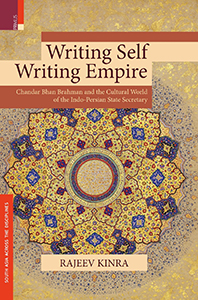
INFORMATION
- AUTHOR : Rajeev Kinra
- HB ISBN : 978-93-84092-69-6
- PB ISBN : 978-93-5290-304-7
- HB Year : 2016, PB Year : 2019
- Extent : 392 pp.
- For sale only in South Asia
- Discount available on checkout
- Usually dispatched within 3 to 5 working days.
Writing Self, Writing Empire
| HB ₹ 1250 . $ . ₤ |
PB ₹ . $ . ₤ |
|
| POD ₹ . $ . ₤ |
e-Book ₹ . $ . ₤ |
INFORMATION
- AUTHOR – Rajeev Kinra
- ISBN – 978-93-84092-69-6
- Year – 2016
- Extent: 400 + 40 coloured illustrations
- 10% discount + free shipping
- Usually dispatched within 3 to 5 working days.
This book examines the life, career, and writings of Chandar Bhan Brahman, a Mughal state secretary who was also one of the great Indo-Persian poets and prose stylists of early modern South Asia. Chandar Bhan was a high-caste Hindu whose life spanned the reigns of four emperors-Akbar, Jahangir, Shah Jahan, and Aurangzeb ‘Alamgir-whose courts dominated the culture and politics of the subcontinent at the height of Mughal imperial power, territorial reach, and global influence. His experience bears vivid testimony to the pluralistic atmosphere of the Mughal court, particularly during the reign of Shah Jahan. His works also touch a range of topics central to contemporary understandings of the court’s literary, mystical, administrative, and ethical cultures, while his letters and autobiographical writings provide valuable examples of early modern
Indo-Persian modes of self-fashioning.
The Author
Rajeev Kinra is Associate Professor in the Department of History at Northwestern University.
This book examines the life, career, and writings of Chandar Bhan Brahman, a Mughal state secretary who was also one of the great Indo-Persian poets and prose stylists of early modern South Asia. Chandar Bhan was a high-caste Hindu whose life spanned the reigns of four emperors-Akbar, Jahangir, Shah Jahan, and Aurangzeb ‘Alamgir-whose courts dominated the culture and politics of the subcontinent at the height of Mughal imperial power, territorial reach, and global influence. His experience bears vivid testimony to the pluralistic atmosphere of the Mughal court, particularly during the reign of Shah Jahan. His works also touch a range of topics central to contemporary understandings of the court’s literary, mystical, administrative, and ethical cultures, while his letters and autobiographical writings provide valuable examples of early modern
Indo-Persian modes of self-fashioning.
The Author
Rajeev Kinra is Associate Professor in the Department of History at Northwestern University.




